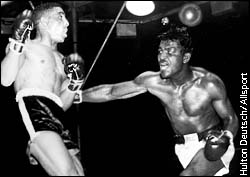

By Larry Schwartz
Special to ESPN.com
"He hit me with this left hook I never seen, heard or felt. As a matter of fact, when I got up, I said, 'Why is Robinson doing exercises between rounds? Look at him over there jumping up and down.' They said, he just won, they counted to 10," said former middleweight champion Gene Fullmer about Sugar Ray Robinson on ESPN's SportsCentury show (Friday, July 30, 10:30 p.m. ET).
Robinson, the only five-time middleweight champion of the world, was voted No. 24 among North American athletes of the 20th century by SportsCentury's distinguished 48-person panel.
Signature game
Feb. 14, 1951 -- In his first 123 fights, Robinson had lost only once ' to Jake LaMotta, eight years ago. While Robinson won their four other bouts, they hadn't fought in more than five years when Robinson attempted to take LaMotta's middleweight crown in Chicago Stadium on Valentine's Day.
 | |
| Robinson was 85-0 as an amateur. |
Sugar Ray was the welterweight champ since 1946 (as well as the Pennsylvania middleweight champ). The first seven rounds were fairly even, with Robinson outboxing and outpunching LaMotta in the early rounds before a resurgent LaMotta came back to score with hard blows to the body and head.
In the eighth round, Robinson took control again - and this time he didn't let up. It looked like a boxing master against an overeager foe as Sugar Ray battered the Raging Bull around the ring, firing stinging stinging jabs and left hooks mixed with right uppercuts and sharp right crosses.
LaMotta made a final stand in a sizzling 11th round, but Sugar Ray regained control before the bell. "I kept swinging and Jake kept standing," Robinson said. "I didn't think I could knock him out."
He didn't, though he kept hammering away. Finally, at 2:04 of the 13th round, referee Frank Sikora stopped the fight, with LaMotta clutching the top rope and absorbing punch after punch without answering.
The fight, which became known as the St. Valentine's Day Massacre, ended the series between the two foes with the score: Robinson 5, LaMotta 1.
Odds and ends
Before turning pro, Robinson won two New York Golden Gloves titles ' in 1938 as a featherweight and in 1939 as a lightweight.
He was 85-0 as an amateur, including 69 knockouts (40 in the first round).
At 22, Robinson defeated an over-the-hill Henry Armstrong in 1943. When a reporter asked if things would have been different if he had fought Robinson in his prime, Armstrong, the only man to hold three titles simultaneously, said, "Mister, I couldn't have licked this kid the best day I ever saw."
On the night before Robinson fought Jimmy Doyle in 1947, he dreamed he killed his opponent with a single left hook. The next morning, a shaken Robinson said he couldn't fight Doyle, but the promoters brought in a Catholic priest who assured Robinson his fears were unfounded. Robinson hit Doyle with a textbook left hook in the eighth round. Doyle was carried from the ring on a stretcher and died the next day.
Robinson was never able to knock down LaMotta in 65 rounds.
When Robinson lost the middleweight title to Randy Turpin in July 1951, he told the new champ, "You were real good, just like everybody said you were. I have no alibis. I was beaten by a better man."
In their rematch two months later, Robinson suffered a hideous gash over his left eye after a head-on collision. Knowing the fight might be stopped, Robinson unleashed a savage attack in the 10th round and regained the crown on a TKO.
Robinson was 4-0 against Bobo Olson, knocking him out three times.
Robinson was a tough negotiator, especially in his dealings with Jim Norris and his International Boxing Club. The "perfect" left hook that Robinson used to knockout Fullmer in the fifth round in 1957 and reclaim the middleweight crown was voted by The Ring in 1997 as the best knockout in the magazine's 75 years of existence.
Pulitzer Prize-winning columnist Red Smith called Robinson "a brooding genius, a darkly dedicated soul who walks in lonely majesty, a prophet without honor, an artist whom nobody, but nobody, understands." Of Robinson's 19 defeats, 15 came after he was 35 years old; 10 were after he turned 40, with five coming when he was 44.
One reason Robinson kept fighting so long was that he needed the money because he had serious tax problems with the IRS.
A month after his last fight, he was honored with a Sugar Ray Robinson Night on Dec. 10, 1965, in Madison Square Garden. He received a huge trophy, but there wasn't a piece of furniture in his shabby Manhattan apartment with legs strong enough to support it.
He was elected to the Boxing Hall of Fame in 1967, two years after he retired.
In 1969 he founded the Sugar Ray Robinson Youth Foundation for inner-city children in the Los Angeles area. The foundation did not sponsor a boxing program.
Robinson said that Ray Leonard asked him when he was starting out if he minded him using the name Sugar Ray. Robinson told him it was okay.
-- Larry Schwartz

